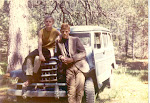
"Alike for those who for today prepare,
And those that after a tomorrow stare,
A Muezzìn from the Tower of Darkness cries
'Fools! your Reward is neither Here nor There.'"
-Rubaiyat of Omar Khayyam
Most everything in our daily universe balances on the edge of advancement and change. Our very humanity remains in a crucial state of technological progress. How bizarre to be our grandparents living in this futuristic wormhole! Donna Haraway, an esteemed literary theorist and writer, takes us on a journey through the mysterious reality of becoming "post human." Her prodigious manifesto breaks new ground as she philosophizes about “cyborgs” and “the machine.” Haraway seeks to help the reader understand the synthesis of human nature and technology. As she makes her way through some of the history behind the idea and creation of cyborgs an ironic concept emerges. The barrier between social reality (150) and science fiction no longer exist; as humans delve further and further in to the unknown we are reverent (149) yet terrified.
Is the creation of the perfect machine the end to our humanity or is it merely the evolution of our species? Haraway’s literary theories coupled with her ideas of a “cyborg world” allow the reader to understand that suddenly boundaries no longer exist. In the beginning, the separation between (wo)man and machine was vivid yet as our technology progresses (at an alarming rate) we must accept our fate. What once was our organic biology of flesh and blood is being integrated with a mechanical organism (150). Haraway questions the veracity of our reality and the irony is that we reap this havoc upon ourselves. There is no turning back. Only literature and history will tell the tale of humanity pre-machine. Her literary theories of Marxism and feminism are distributed throughout the chapter. She claims there is suddenly a lack of social unity due to the onset of the cyborg revolution and she fears that gender issues will take a backseat to the technological explosion. Ironically, the Marxist ideal of community and social progress is what propelled these advancements in science. The feminine half of the species is the original example of organic reproduction. Haraway deals with the idea that because cyborgs and humans share a respective brain our very nature is being compensated. “Nature and culture are reworked; the one can no longer be the resource for appropriation or incorporation by the other” (152).





No comments:
Post a Comment